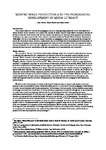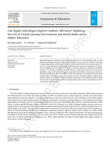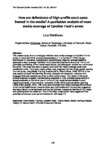Moving image production and the pedagogical development of media literacy

Date
2012-04Author
Subject
Metadata
Show full item recordAbstract
This chapter states the case for the pedagogical value of moving image production in the development of media literacy. In the context of this chapter, the concept of media literacy is extended to encompass not just the ability to critically 'read' media texts but also involves the practices of 'making' media products and artefacts. Drawing on the experiences of two of the authors' involvement with the Bristol Natural History Consortium's Wild Ideas DVD as a case study, this chapter illustrates the pedagogical value of using media technologies to enable the learning of critical abilities, competencies and skills through the active production of media texts. In concluding, we propose that moving image production work not only contributes to the development of media literacy (a valuable life skill in its own right) but also contributes to personal and social development as well as potentially fostering other transferable skills and competencies for employability and citizenship.
Description
Collections
Publisher
Place of Publication
Editor
Parent title
Author URL
Publisher URL
Recommended, similar items
The following license files are associated with this item:
Related items
Showing items related by title, author, creator and subject.
-
Can digital technologies improve students' efficiency? Exploring the role of Virtual Learning Environment and Social Media use in Higher Education
Lacka, E; Wong, TC; Haddoud, Mohamed Yacine (Elsevier BV, 2021-04)Digital technologies, including Virtual Learning Environment (VL) and Social Media (SM), are well adopted in the Higher Education (HE) setting, yet little is known about the role these tools play in supporting students' ... -
ANTI-SOCIAL MEDIA? AN EXPLORATION INTO THE BOUNDARIES OF LEISURE AND HARM, REGARDING THE USE OF SOCIAL MEDIA PLATFORMS
Farmer, Holly (Plymouth Business School, University of Plymouth, 2018)Processes of globalisation have led us to inhibit a world that is increasingly interconnected, and where technological advancements have placed the internet at our fingertips, for use at virtually any place and time ... -
How are defendants of high-profile court cases framed in the media? A qualitative analysis of news media coverage of Caroline Flack’s arrest
Matthews, L. (University of Plymouth, 2021)This present study aims to investigate whether news media coverage on Caroline Flack’s arrest, in December 2019, showed characteristics of ‘Trial by Media’ (TBM) through identification of one-sided, unbalanced or predominantly ...



